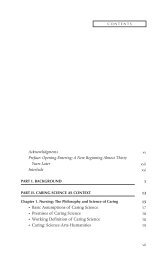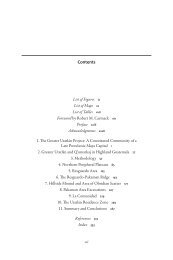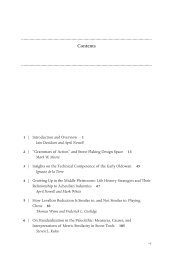free download - University Press of Colorado
free download - University Press of Colorado
free download - University Press of Colorado
You also want an ePaper? Increase the reach of your titles
YUMPU automatically turns print PDFs into web optimized ePapers that Google loves.
Introduction<br />
vulnerability to key hazards by implementing ill-conceived mitigation strategies<br />
focused on short-term solutions. In addition, Paulette observes a pattern<br />
in the increasing distribution <strong>of</strong> risk to different elements <strong>of</strong> society in tandem<br />
with growing social stratification and the emergence <strong>of</strong> an elite. Therefore<br />
Paulette raises key criticisms surrounding the themes <strong>of</strong> authority and social<br />
hierarchy in disaster management practice that echo some <strong>of</strong> the ideas Sheets<br />
developed around decentralized mitigation management even within statelevel<br />
societies.<br />
Chapter 8. Nelson and colleagues encourage us to consider aspects <strong>of</strong> resilience<br />
and vulnerability to environmental hazards using carefully selected case<br />
studies from the US Southwest and northern Mexico that provide examples<br />
<strong>of</strong> alternative human behavior in the face <strong>of</strong> similar environmental stress. The<br />
enormous body <strong>of</strong> archaeological data generated in this region is complemented<br />
by a uniquely detailed paleoclimatic reconstruction established by<br />
over 100 years <strong>of</strong> dendroclimatological research in the region. This interdisciplinary<br />
body <strong>of</strong> data provides a rare opportunity to look more closely at the<br />
cause and effect between social development and the problems created by environmental<br />
change. Using the ancestral communities in Mimbres, Hohokam,<br />
and Zuni regions <strong>of</strong> the United States and prehispanic communities around<br />
La Quemada in northern Mexico, Nelson and colleagues look at the relative<br />
success <strong>of</strong> different mitigation strategies in the face <strong>of</strong> precipitation variability<br />
over time. These case studies force us to think about the processes behind<br />
human decision-making and consider the medium- to long-term consequences<br />
<strong>of</strong> short-term solutions to the impacts <strong>of</strong> environmental hazards. This chapter<br />
provides key lessons for the implementation <strong>of</strong> mitigation strategies that clearly<br />
have direct relevance for modern-day populations living in the Southwest and<br />
facing very similar environmental hazards. These lessons from the past include<br />
the need to create carefully selected crop diversity that considers the climatic<br />
parameters <strong>of</strong> individual plants. The Hohokam case study also highlights the<br />
dangers <strong>of</strong> social isolation and the importance <strong>of</strong> maintaining regional interaction<br />
networks that enable resource procurement during times <strong>of</strong> need. Finally,<br />
this chapter makes us question whether absolute resilience to climatic variability<br />
is ever a realistic prospect for human communities; perhaps we should<br />
change the ultimate objective and work toward maximizing the adaptive capacity<br />
<strong>of</strong> human communities to identify and manage the inevitable challenges <strong>of</strong><br />
environmental change.<br />
Chapter 9. Kohler helps us consider the role <strong>of</strong> sudden environmental<br />
change within the wider framework <strong>of</strong> human social evolution. Providing<br />
an overview <strong>of</strong> key themes from the different chapters within the historical<br />
framework <strong>of</strong> archaeological thought and practice, Kohler enables the reader<br />
11





